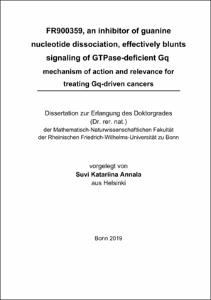Annala, Suvi Katariina: FR900359, an inhibitor of guanine nucleotide dissociation, effectively blunts signaling of GTPase-deficient Gq : mechanism of action and relevance for treating Gq-driven cancers. - Bonn, 2019. - Dissertation, Rheinische Friedrich-Wilhelms-Universität Bonn.
Online-Ausgabe in bonndoc: https://nbn-resolving.org/urn:nbn:de:hbz:5n-55152
Online-Ausgabe in bonndoc: https://nbn-resolving.org/urn:nbn:de:hbz:5n-55152
@phdthesis{handle:20.500.11811/8040,
urn: https://nbn-resolving.org/urn:nbn:de:hbz:5n-55152,
author = {{Suvi Katariina Annala}},
title = {FR900359, an inhibitor of guanine nucleotide dissociation, effectively blunts signaling of GTPase-deficient Gq : mechanism of action and relevance for treating Gq-driven cancers},
school = {Rheinische Friedrich-Wilhelms-Universität Bonn},
year = 2019,
month = aug,
note = {Uveal melanoma (UM), the most common cancer of the adult eye, is known to have poor prognosis. Over 50% of patients are likely to develop metastasis. In more than 80% of the cases UM is driven by an activating mutation in the Gq/11 protein. Thus, many attempts have been made to target downstream signaling of this oncogene. Unfortunately, none of these approaches have succeeded so far in clinical trials. Targeting only one or even two downstream effectors in combination, may not be sufficient to blunt the oncogenic dynamics of the Gq/11 protein. Direct inhibition of the oncogene itself was believed to be ineffective, since the mode of action of the only known inhibitors for Gq/11 proteins, FR900359 (FR) and YM-254890 (YM) respectively, was considered unsuitable for targeting the constitutively active oncogenes.
FR is a macrocyclic depsipeptide, produced by symbiotic bacteria. Recent studies have shown that by binding to Gα-subunits of Gq/11 proteins FR inhibits the nucleotide exchange that is crucial for their activation. Because FR interferes with the rate-limiting step of Gα activation, it was reasoned that this approach might be unsuitable to target a protein, which is already trapped in the active state.
Accidentally, however, Evelyn Gaffal, Thomas Tüting and coworkers found that FR inhibited diverse cancer hall marks in melanoma cells, harboring an activating mutation in the G11 protein. These surprising results prompted us to further investigate the inhibition properties of FR on the oncogenic Gq/11 protein. In the frame of this work, we demonstrate FRs’ ability to suppress mitogenic pro-survival pathways over the canonical phospholipase C (PLC) effector cascade. Taking advantage of genome edited HEK293 cells lacking Gαq and Gα11 proteins, we were furthermore able to show direct interaction of the molecule with its target protein. Results of FRET experiments together with molecular modeling gave first hints regarding the mechanism underlying the inability to target PLC-Gqmut interaction. Whole cell label-free technology unveiled a possible mode of action of FR on the mutated protein. Most importantly, we were able to proof inhibition of the oncogene in a therapeutically relevant system. By using different uveal melanoma cell lines, we demonstrated in vitro and in vivo the inhibition of tumor progression by FR treatment. Further, direct comparison of FR with the other well described Gq-inhibitor YM, revealed the long-term superiority of FR, as we observed different drug vulnerability between the two molecules.},
url = {https://hdl.handle.net/20.500.11811/8040}
}
urn: https://nbn-resolving.org/urn:nbn:de:hbz:5n-55152,
author = {{Suvi Katariina Annala}},
title = {FR900359, an inhibitor of guanine nucleotide dissociation, effectively blunts signaling of GTPase-deficient Gq : mechanism of action and relevance for treating Gq-driven cancers},
school = {Rheinische Friedrich-Wilhelms-Universität Bonn},
year = 2019,
month = aug,
note = {Uveal melanoma (UM), the most common cancer of the adult eye, is known to have poor prognosis. Over 50% of patients are likely to develop metastasis. In more than 80% of the cases UM is driven by an activating mutation in the Gq/11 protein. Thus, many attempts have been made to target downstream signaling of this oncogene. Unfortunately, none of these approaches have succeeded so far in clinical trials. Targeting only one or even two downstream effectors in combination, may not be sufficient to blunt the oncogenic dynamics of the Gq/11 protein. Direct inhibition of the oncogene itself was believed to be ineffective, since the mode of action of the only known inhibitors for Gq/11 proteins, FR900359 (FR) and YM-254890 (YM) respectively, was considered unsuitable for targeting the constitutively active oncogenes.
FR is a macrocyclic depsipeptide, produced by symbiotic bacteria. Recent studies have shown that by binding to Gα-subunits of Gq/11 proteins FR inhibits the nucleotide exchange that is crucial for their activation. Because FR interferes with the rate-limiting step of Gα activation, it was reasoned that this approach might be unsuitable to target a protein, which is already trapped in the active state.
Accidentally, however, Evelyn Gaffal, Thomas Tüting and coworkers found that FR inhibited diverse cancer hall marks in melanoma cells, harboring an activating mutation in the G11 protein. These surprising results prompted us to further investigate the inhibition properties of FR on the oncogenic Gq/11 protein. In the frame of this work, we demonstrate FRs’ ability to suppress mitogenic pro-survival pathways over the canonical phospholipase C (PLC) effector cascade. Taking advantage of genome edited HEK293 cells lacking Gαq and Gα11 proteins, we were furthermore able to show direct interaction of the molecule with its target protein. Results of FRET experiments together with molecular modeling gave first hints regarding the mechanism underlying the inability to target PLC-Gqmut interaction. Whole cell label-free technology unveiled a possible mode of action of FR on the mutated protein. Most importantly, we were able to proof inhibition of the oncogene in a therapeutically relevant system. By using different uveal melanoma cell lines, we demonstrated in vitro and in vivo the inhibition of tumor progression by FR treatment. Further, direct comparison of FR with the other well described Gq-inhibitor YM, revealed the long-term superiority of FR, as we observed different drug vulnerability between the two molecules.},
url = {https://hdl.handle.net/20.500.11811/8040}
}






